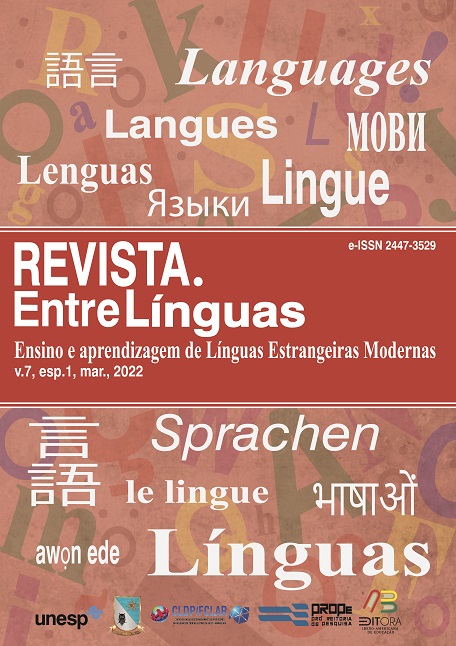Termos de cores e unidades fraseológicas de jargão de esportes
Línguas russa e francesa
DOI:
https://doi.org/10.29051/el.v8iesp.1.16937Palavras-chave:
Visão de mundo da linguagem, Comunicação esportiva, Linguocultura, Termos esportivos, FraseologiaResumo
O estudo discute alguns aspectos da comunicação esportiva e da visão de mundo linguística levando em conta os parâmetros nacionais e culturais. Em particular, os autores do artigo estudam unidades fraseológicas esportivas com componentes coloronim em russo e francês. Eles descrevem vários componentes da visão de mundo esportiva em duas culturas linguísticas, cujo elemento chave é a personalidade linguística de um falante nativo comum. Os dados empíricos são analisados e interpretados com base na abordagem linguo-semiótica, ou seja, no âmbito de um discurso e no nível do fundo nominativo do russo e do francês. Os termos desportivos são considerados ao nível das dominantes linguísticas e etnoculturais gerais dos jargões nacionais. A hipótese é que a estrutura de qualquer discurso é baseada no uso de termos profissionais e jargões (em particular esportivos). Sua semântica se correlaciona com a autoidentificação linguística de cada nação.
Downloads
Referências
ABBYY. ABBYY Lingvo X3 ME: Slang disctionaries. Мoscow: Lingvo, 1996-201. Available in: http://www.lingvo.ru/lingvox3/medved. Access in: 14 Oct. 2020.
AKIMOVA, E. N. Kolorativy v povesti I.S. Shmeleva "Leto Gospodne" i tsvetosemantika pravoslavnoi yazykovoi kartiny mira [Coloratives in I.S. Shmelev's "Summer of the Lord" and color semantics in the Orthodox language worldview]. Arzamas: AGPI, 2012.
BLANCHET, B.; LESAY, J. D. Le Dico du parler sport [The dictionary of sports talk]. Paris: Fetjaine, 2012.
BOBYREVA, N. N. Eponimicheskie edinitsy v terminosistemakh sportivnoi i khudozhestvennoi gimnastiki (na primere russkogo i angliiskogo yazykov) [Eponymic items in the term systems of rhythmic and artistic gymnastics (as exemplified by Russian and English)]. Voronezh: Istoki, 2012.
BOGOSLOVSKAYA, V. R. Aktivnye protsessy v sportivnoi terminologii sovremennogo russkogo yazyka [Active processes in sports terms of modern Russian]. Saint Petersburg: St. Petersburg State University Publishing House, 2002.
CHUDINOV, A. P. Sportivnaya metafora v sovremennom rossiiskom politicheskom diskurse [Sports metaphors in the political discourse of modern Russia]. Vestnik Samarskogo Gosudarstvennogo Universiteta, Seriya "Lingvistika i Mezhkulturnaya Kommunikatsiya", v. 2, p. 26-31, 2001. Available in: http://www.vestnik.vsu.ru/pdf/lingvo/2001/02/chudinov.pdf. Access in/: 14 June 2021.
ELISTRATOV, A. A. Imennaya neterminologicheskaya leksika sporta [The noun and non-term vocabulary of sports]. Vestnik Chelyabinskogo gosudarstvennogo universiteta, v. 34, n. 172, Filologiya. Iskusstvovedenie, n. 36, p. 26-32, 2009.
FILIPPOVA, E. I. Territoriya kollektivnoi identichnosti v sovremennom frantsuzskom diskurse [The scope of collective identity in the modern French discourse]. Moscow: Russian Academy of Sciences, 2010.
KOZHEVNIKOVA, I. G. Russkaya sportivnaya leksika: Strukturno-semanticheskoe opisanie [The Russian sports vocabulary: Sstructural and semantic description] Voronezh: Izd-vo Voronezh. gos. un-ta, 2002.
LIGAS, P. Registres, stéréotypes et charge culturelle des mots dans le discours sportif non normatif [Registers, stereotypes, and cultural weight of words in non-normative sports discourse]. Éla. Études de linguistique appliquée, v. 165, n. 1, p. 13-27, 2012. Available in: https://www.cairn.info/revue-ela-2012-1-page-13.htm. Access in: 14 Jan. 2021.
MAHAL, I. Aktivnye protsessy v sportivnoi terminologii sovremennogo russkogo yazyka [Active processes in sports terms of modern Russian]. Brno: Masaryk University, 2008.
MALYSHEVA, E. G. Sistema kontseptualnykh dominant russkogo sportivnogo diskursivnogo prostranstva [The system of conceptual dominants of the Russian sports discourse]. Yazyk. Tekst. Diskurs: Nauchnyi almanakh Stavropolskogo otdeleniya RALK, n. 9, p. 114-121, 2011.
MERLE, P. Le foot comme on le cause [Football as we mean it]. Paris: Hors collection, 2001.
MOUSSET, E. Мétaphore sportive. Profstory, 2010. Available in: http://profstory.blogspot.ru/2010/01/une-metaphore-sportive.html. Access in: 15 Mar. 2021.
NIKITINA, K. A. Professional sports phraseology: Classification by origin. Moscow: Young scientist, 2013.
Otkuda poshlo vyrazheniye "Sud'yu na mylo"? [Where did the expression "turn the referee into soap" come from?]. Otvety, 2008. Available in: https://otvet.mail.ru/question/8179015. Access in: 14 Jan. 2021.
PRUVOST, J.; SEDYKH, A. P.; BUZINOVA, L. M. Tekst, kontekst, intertekst: Sintez smysloporozhdenija [Text, context, intertext: Synthesis of the generation of meaning]. Nauchnyj rezultat. Voprosy teoreticheskoj i prikladnoj lingvistiki [Scientific Result. Theoretical and Applied Linguistics], v. 4, n. 3, p. 21-35, 2018. Available in: https://cyberleninka.ru/article/n/tekst-kontekst-intertekst-sintez-smysloporozhdeniya/viewer. Access in: 15 Jan. 2021.
RIVELINO, R. Ot finta. 7 effektnykh i praktichnykh obmannykh dvizheniy [From the feint. 7 spectacular and practical deceptive moves]. Mar. 27, 2013. Available in: http://www.sports.ru/tribuna/blogs/footballweekly/440254.html. Access in: 14 Jan. 2021.
SEDYKH, A. P. et al. Universal and national cultural features of the naming in sports. Revista Turismo Estudos & Práticas, n. S3, p. 61, 2020.
SEDYKH, A. P.; MARABINI, A. Frazeologija i perevod: Francuzskij, ital'janskij i russkij jazyki. Uchebno-metodicheskoe posobie [Phraseology and translation: French, Italian and Russian. Study guide]. Belgorod: Epitsentr, 2021. 252 p.
SHAMONAEV, O. Yazyk sporta. Bestolkovyy slovar'-9 [The language of sports. Clueless dictionary-9]. Mar. 20, 2013. Available in: http://helghelg2.livejournal.com/10433.html. Access in: 14 Jan. 2021.
SPEAK-SPORT. Glossaire sport-français, 2022. Available in: http://speaksport.free.fr. Access in: 20 Jan. 2022.
ZILBERT, A. B. Sportivnyi diskurs: Tochki peresecheniya s drugimi diskursami (problemy intertekstualnosti) [Sports discourse: Intersection with other discourses (intertextuality issues)]. In: KRASNYKH, V. V.; IZOTOV, A. I. (Eds.). Yazyk soznanie kommunikatsiya: Collection of articles. Moscow: MAKS Press, 2001. n. 19, p. 103-112.
Downloads
Publicado
Como Citar
Edição
Seção
Licença

Este trabalho está licenciado sob uma licença Creative Commons Attribution-NonCommercial-ShareAlike 4.0 International License.
Os manuscritos aceitos e publicados são de propriedade da Revista EntreLínguas. Os artigos publicados e as referências citadas na Revista EntreLínguas são de inteira responsabilidade de seus autores.
Transferência de direitos autorais – autorização para publicação
Caso o artigo submetido seja aprovado para publicação, já fica acordado que o(s) autor(es) autoriza(m) a UNESP a reproduzi-lo e publicá-lo na EntreLínguas, entendendo-se os termos “reprodução” e “publicação” conforme definição respectivamente dos incisos VI e I do artigo 5° da Lei 9610/98. O artigo poderá ser acessado pela rede mundial de computadores (Internet), sendo permitidas, a título gratuito, a consulta e a reprodução de exemplar do artigo para uso próprio de quem a consulta, desde que haja a citação ao texto consultado. Essa autorização de publicação 328 EntreLínguas, Araraquara, v. 1, n .2, p. 323-328, jul./dez. 2015 não tem limitação de tempo, ficando a UNESP responsável pela manutenção da identificação do(s) autor(es) do artigo. Os artigos publicados e as referências citadas na Revista EntreLínguas são de inteira responsabilidade de seus autores.











